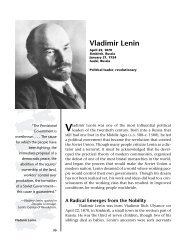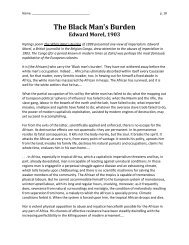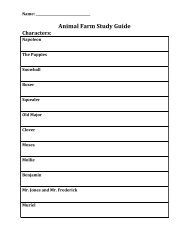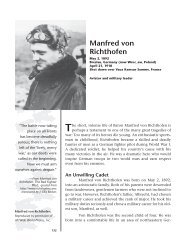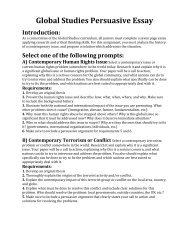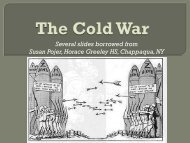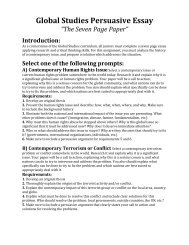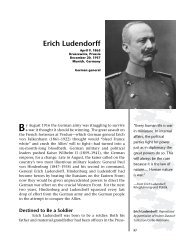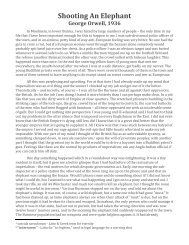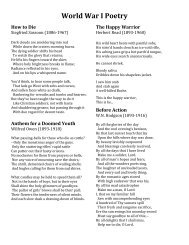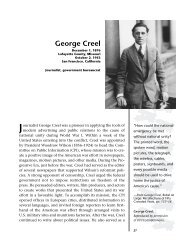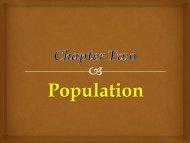Poetry of World War I
Poetry of World War I
Poetry of World War I
You also want an ePaper? Increase the reach of your titles
YUMPU automatically turns print PDFs into web optimized ePapers that Google loves.
Wilfred Owen (1893–1918)<br />
Unlike poets Alan Seeger and<br />
Rupert Brooke, Wilfred Owen wrote not <strong>of</strong><br />
the glory <strong>of</strong> war but <strong>of</strong> the pity <strong>of</strong> war.<br />
Owen was born in Oswestry, England, on<br />
March 18, 1893, to a humble, religious<br />
family. Owen excelled at school and<br />
eventually attended the University <strong>of</strong><br />
London, but he was forced to leave the<br />
university when he ran short <strong>of</strong> money. He<br />
worked for a time as a reverend’s assistant<br />
and as a schoolteacher, but he had not yet<br />
found his calling when he decided to enroll<br />
in the English army in the summer <strong>of</strong> 1915.<br />
Owen served as an <strong>of</strong>ficer in the<br />
Second Battalion Manchester Regiment,<br />
and he saw plenty <strong>of</strong> action. Leading a<br />
regiment in a battle at Serre, he saw many<br />
<strong>of</strong> his men killed and wounded. These<br />
memories <strong>of</strong> battle would soon fuel an<br />
outpouring <strong>of</strong> poetry. In 1917 Owen was<br />
hospitalized with a concussion and shell<br />
shock (a term indicating that a soldier was<br />
so mentally distraught from fighting that<br />
he could no longer serve). At the<br />
Craiglockhart <strong>War</strong> Hospital in Edinburgh,<br />
Scotland, Owen met poet Siegfried<br />
Sassoon. The two poets spurred each other<br />
on, and both created some <strong>of</strong> their<br />
greatest works while at the hospital.<br />
Owen returned to active duty in<br />
September 1918 and was soon sent to<br />
attack some <strong>of</strong> the Germans’ strongest<br />
defensive positions on the Hindenburg line<br />
(a line <strong>of</strong> concrete-reinforced trenches built<br />
by the Germans). Owen earned a Military<br />
Cross (war medal) for his efforts, but he was<br />
soon killed in a battle on November 4,<br />
1918, one week before the end <strong>of</strong> the war.<br />
Owen’s friends and admirers—including<br />
Sassoon—made sure that Owen’s poetry<br />
was published, and Owen is now considered<br />
one <strong>of</strong> the greatest <strong>of</strong> the war poets.<br />
Was my life also; I went hunting wild<br />
After the wildest beauty in the world,<br />
Which lies not calm in eyes, or braided hair,<br />
But mocks the steady running <strong>of</strong> the hour,<br />
And if it grieves, grieves richlier than here.<br />
For by my glee might many men have laughed,<br />
And <strong>of</strong> my weeping something had been left,<br />
Which must die now. I mean the truth untold,<br />
The pity <strong>of</strong> war, the pity war distilled.<br />
Now men will go content with what we spoiled,<br />
Or, discontent, boil bloody, and be spilled.<br />
They will be swift with swiftness <strong>of</strong> the tigress.<br />
Literature <strong>of</strong> the Great <strong>War</strong>: <strong>Poetry</strong> <strong>of</strong> <strong>World</strong> <strong>War</strong> I 123



